The main goal of this research is to propose a realistic benchmark dataset to support the development of new cybersecurity solutions for internet of vehicles (IoV) operations. To accomplish this, five attacks were executed against the fully intact inner structure of a 2019 Ford car, complete with all Electronic Control Units (ECUs). However, the vehicle was rendered immobile and incapable of causing any potential harm or injuries. Hence, all attacks were carried out on the vehicle without endangering the car's driver or passengers.
These attacks are classified as spoofing and Denial-of-Service (DoS) and were carried out through the CAN-BUS protocol. This effort establishes a baseline complementary to existing contributions and supports researchers to propose new IoV solutions to strengthen the overall security using different techniques (e.g., Machine Learning - ML).
The main contributions are:
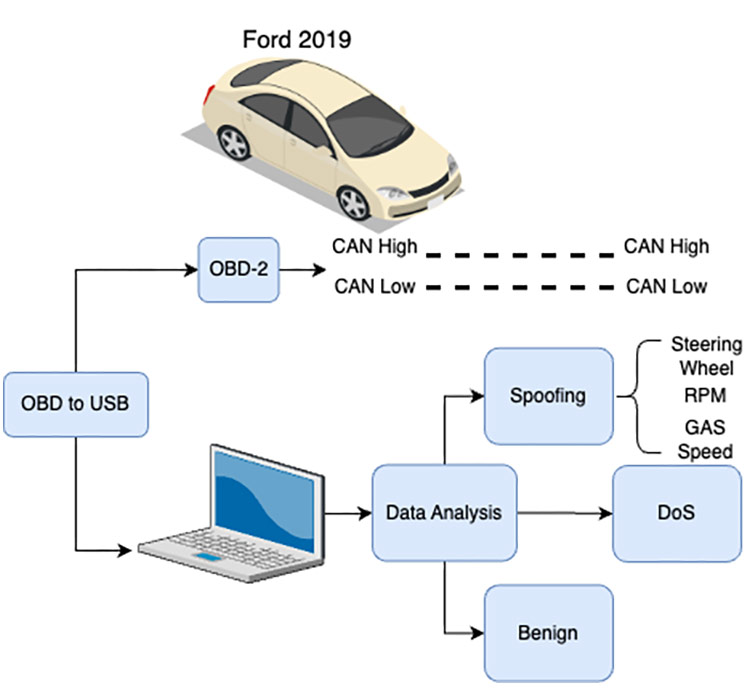
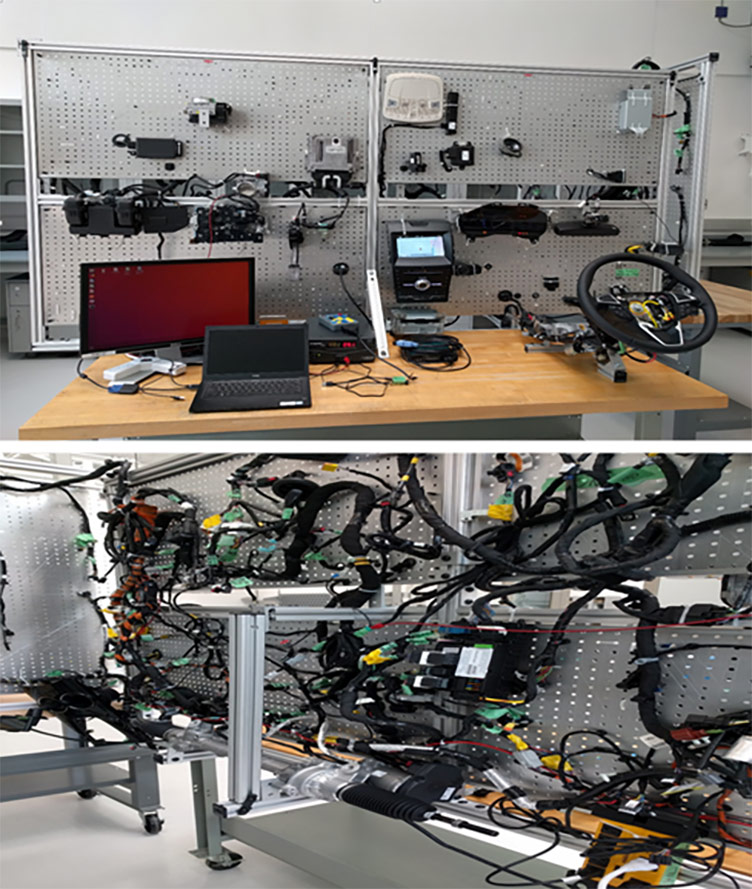
Features extracted for the CICIoV2024 dataset
| Feature name | Description |
| ID | Arbitration - indicates the priority of the message and the type of data it carries. |
| DATA_0 | Byte 0 of the data transmitted. |
| DATA_1 | Byte 1 of the data transmitted. |
| DATA_2 | Byte 2 of the data transmitted. |
| DATA_3 | Byte 3 of the data transmitted. |
| DATA_4 | Byte 4 of the data transmitted. |
| DATA_5 | Byte 5 of the data transmitted. |
| DATA_6 | Byte 6 of the data transmitted. |
| DATA_7 | Byte 7 of the data transmitted. |
| label | The identification of benign or malicious traffic. |
| category | The identification of the category to which the traffic belongs. |
| specific_class | The identification of the specific class of the traffic. |
| mean | std | min | 25% | 50% | 75% | max | |
| ID | 537.207946 | 322.479994 | 65 | 357 | 516 | 578 | 1438 |
| DATA_0 | 71.0865995 | 88.9771748 | 0 | 0 | 16 | 127 | 255 |
| DATA_1 | 69.9892503 | 95.5837431 | 0 | 0 | 12 | 128 | 255 |
| DATA_2 | 55.0112724 | 72.7658378 | 0 | 0 | 13 | 125 | 255 |
| DATA_3 | 57.4536383 | 90.3207664 | 0 | 0 | 0 | 92 | 255 |
| DATA_4 | 45.2851673 | 64.4583498 | 0 | 0 | 6 | 86 | 255 |
| DATA_5 | 53.8826134 | 94.3361202 | 0 | 0 | 0 | 63 | 255 |
| DATA_6 | 71.7491441 | 101.687183 | 0 | 0 | 0 | 138 | 255 |
| DATA_7 | 60.2747691 | 99.9654672 | 0 | 0 | 0 | 80 | 255 |
| mean | std | min | 25% | 50% | 75% | max | |
| ID0 | 0 | 0 | 0 | 0 | 0 | 0 | 0 |
| ID1 | 0 | 0 | 0 | 0 | 0 | 0 | 0 |
| ID2 | 0 | 0 | 0 | 0 | 0 | 0 | 0 |
| ID3 | 0 | 0 | 0 | 0 | 0 | 0 | 0 |
| ID4 | 0 | 0 | 0 | 0 | 0 | 0 | 0 |
| ID5 | 0 | 0 | 0 | 0 | 0 | 0 | 0 |
| ID6 | 0.16952406 | 0.37521428 | 0 | 0 | 0 | 0 | 1 |
| ID7 | 0.42718498 | 0.49466973 | 0 | 0 | 0 | 1 | 1 |
| ID8 | 0.29153065 | 0.45446747 | 0 | 0 | 0 | 1 | 1 |
| ID9 | 0.13162299 | 0.33808056 | 0 | 0 | 0 | 0 | 1 |
| ID10 | 0.37840989 | 0.48499074 | 0 | 0 | 0 | 1 | 1 |
| ID11 | 0.50427242 | 0.49998192 | 0 | 0 | 1 | 1 | 1 |
| ID12 | 0.48455602 | 0.4997616 | 0 | 0 | 0 | 1 | 1 |
| ID13 | 0.19254321 | 0.39429739 | 0 | 0 | 0 | 0 | 1 |
| ID14 | 0.5746173 | 0.49440108 | 0 | 0 | 1 | 1 | 1 |
| ID15 | 0.46847259 | 0.49900521 | 0 | 0 | 0 | 1 | 1 |
| ID16 | 0.53340638 | 0.49888294 | 0 | 0 | 1 | 1 | 1 |
| DATA_00 | 0 | 0 | 0 | 0 | 0 | 0 | 0 |
| DATA_01 | 0 | 0 | 0 | 0 | 0 | 0 | 0 |
| DATA_02 | 0 | 0 | 0 | 0 | 0 | 0 | 0 |
| DATA_03 | 0 | 0 | 0 | 0 | 0 | 0 | 0 |
| DATA_04 | 0 | 0 | 0 | 0 | 0 | 0 | 0 |
| DATA_05 | 0 | 0 | 0 | 0 | 0 | 0 | 0 |
| DATA_06 | 0 | 0 | 0 | 0 | 0 | 0 | 0 |
| DATA_07 | 0 | 0 | 0 | 0 | 0 | 0 | 0 |
| DATA_08 | 0 | 0 | 0 | 0 | 0 | 0 | 0 |
| DATA_09 | 0.22309243 | 0.41631998 | 0 | 0 | 0 | 0 | 1 |
| DATA_010 | 0.34454158 | 0.47521873 | 0 | 0 | 0 | 1 | 1 |
| DATA_011 | 0.31769774 | 0.4655814 | 0 | 0 | 0 | 1 | 1 |
| DATA_012 | 0.33472706 | 0.47189513 | 0 | 0 | 0 | 1 | 1 |
| DATA_013 | 0.31426362 | 0.46422209 | 0 | 0 | 0 | 1 | 1 |
| DATA_014 | 0.37693711 | 0.48461912 | 0 | 0 | 0 | 1 | 1 |
| DATA_015 | 0.32008942 | 0.46651081 | 0 | 0 | 0 | 1 | 1 |
| DATA_016 | 0.29611019 | 0.45654035 | 0 | 0 | 0 | 1 | 1 |
| DATA_10 | 0 | 0 | 0 | 0 | 0 | 0 | 0 |
| DATA_11 | 0 | 0 | 0 | 0 | 0 | 0 | 0 |
| DATA_12 | 0 | 0 | 0 | 0 | 0 | 0 | 0 |
| DATA_13 | 0 | 0 | 0 | 0 | 0 | 0 | 0 |
| DATA_14 | 0 | 0 | 0 | 0 | 0 | 0 | 0 |
| DATA_15 | 0 | 0 | 0 | 0 | 0 | 0 | 0 |
| DATA_16 | 0 | 0 | 0 | 0 | 0 | 0 | 0 |
| DATA_17 | 0 | 0 | 0 | 0 | 0 | 0 | 0 |
| DATA_18 | 0 | 0 | 0 | 0 | 0 | 0 | 0 |
| DATA_19 | 0.28475827 | 0.45129939 | 0 | 0 | 0 | 1 | 1 |
| DATA_110 | 0.24356439 | 0.42923293 | 0 | 0 | 0 | 0 | 1 |
| DATA_111 | 0.28651083 | 0.45213109 | 0 | 0 | 0 | 1 | 1 |
| DATA_112 | 0.24899749 | 0.43243251 | 0 | 0 | 0 | 0 | 1 |
| DATA_113 | 0.31631799 | 0.46503879 | 0 | 0 | 0 | 1 | 1 |
| DATA_114 | 0.35077854 | 0.47721391 | 0 | 0 | 0 | 1 | 1 |
| DATA_115 | 0.28126236 | 0.44961538 | 0 | 0 | 0 | 1 | 1 |
| DATA_116 | 0.30358204 | 0.45980445 | 0 | 0 | 0 | 1 | 1 |
| DATA_20 | 0 | 0 | 0 | 0 | 0 | 0 | 0 |
| DATA_21 | 0 | 0 | 0 | 0 | 0 | 0 | 0 |
| DATA_22 | 0 | 0 | 0 | 0 | 0 | 0 | 0 |
| DATA_23 | 0 | 0 | 0 | 0 | 0 | 0 | 0 |
| DATA_24 | 0 | 0 | 0 | 0 | 0 | 0 | 0 |
| DATA_25 | 0 | 0 | 0 | 0 | 0 | 0 | 0 |
| DATA_26 | 0 | 0 | 0 | 0 | 0 | 0 | 0 |
| DATA_27 | 0 | 0 | 0 | 0 | 0 | 0 | 0 |
| DATA_28 | 0 | 0 | 0 | 0 | 0 | 0 | 0 |
| DATA_29 | 0.16682206 | 0.37281706 | 0 | 0 | 0 | 0 | 1 |
| DATA_210 | 0.23185811 | 0.42203902 | 0 | 0 | 0 | 0 | 1 |
| DATA_211 | 0.30791589 | 0.46163172 | 0 | 0 | 0 | 1 | 1 |
| DATA_212 | 0.25489004 | 0.435579955 | 0 | 0 | 0 | 1 | 1 |
| DATA_213 | 0.33766694 | 0.47291451 | 0 | 0 | 0 | 1 | 1 |
| DATA_214 | 0.30989072 | 0.4624485 | 0 | 0 | 0 | 1 | 1 |
| DATA_215 | 0.30772841 | 0.46155367 | 0 | 0 | 0 | 1 | 1 |
| DATA_216 | 0.33122476 | 0.47065388 | 0 | 0 | 0 | 1 | 1 |
| DATA_30 | 0 | 0 | 0 | 0 | 0 | 0 | 0 |
| DATA_31 | 0 | 0 | 0 | 0 | 0 | 0 | 0 |
| DATA_32 | 0 | 0 | 0 | 0 | 0 | 0 | 0 |
| DATA_33 | 0 | 0 | 0 | 0 | 0 | 0 | 0 |
| DATA_34 | 0 | 0 | 0 | 0 | 0 | 0 | 0 |
| DATA_35 | 0 | 0 | 0 | 0 | 0 | 0 | 0 |
| DATA_36 | 0 | 0 | 0 | 0 | 0 | 0 | 0 |
| DATA_37 | 0 | 0 | 0 | 0 | 0 | 0 | 0 |
| DATA_38 | 0 | 0 | 0 | 0 | 0 | 0 | 0 |
| DATA_39 | 0.1918338 | 0.39374319 | 0 | 0 | 0 | 0 | 1 |
| DATA_310 | 0.25849389 | 0.43780696 | 0 | 0 | 0 | 1 | 1 |
| DATA_311 | 0.23691912 | 0.4251924 | 0 | 0 | 0 | 0 | 1 |
| DATA_312 | 0.29121678 | 0.45432336 | 0 | 0 | 0 | 1 | 1 |
| DATA_313 | 0.2679498 | 0.44289146 | 0 | 0 | 0 | 1 | 1 |
| DATA_314 | 0.29034333 | 0.45392095 | 0 | 0 | 0 | 1 | 1 |
| DATA_315 | 0.26623629 | 0.44198944 | 0 | 0 | 0 | 1 | 1 |
| DATA_316 | 0.27697894 | 0.44750614 | 0 | 0 | 0 | 1 | 1 |
| DATA_40 | 0 | 0 | 0 | 0 | 0 | 0 | 0 |
| DATA_41 | 0 | 0 | 0 | 0 | 0 | 0 | 0 |
| DATA_42 | 0 | 0 | 0 | 0 | 0 | 0 | 0 |
| DATA_43 | 0 | 0 | 0 | 0 | 0 | 0 | 0 |
| DATA_44 | 0 | 0 | 0 | 0 | 0 | 0 | 0 |
| DATA_45 | 0 | 0 | 0 | 0 | 0 | 0 | 0 |
| DATA_46 | 0 | 0 | 0 | 0 | 0 | 0 | 0 |
| DATA_47 | 0 | 0 | 0 | 0 | 0 | 0 | 0 |
| DATA_48 | 0 | 0 | 0 | 0 | 0 | 0 | 0 |
| DATA_49 | 0.11576182 | 0.31993921 | 0 | 0 | 0 | 0 | 1 |
| DATA_410 | 0.25658935 | 0.43675095 | 0 | 0 | 0 | 1 | 1 |
| DATA_411 | 0.18494851 | 0.38825593 | 0 | 0 | 0 | 0 | 1 |
| DATA_412 | 0.23620332 | 0.42474868 | 0 | 0 | 0 | 0 | 1 |
| DATA_413 | 0.2521845 | 0.4346675 | 0 | 0 | 0 | 1 | 1 |
| DATA_414 | 0.30246503 | 0.45932569 | 0 | 0 | 0 | 1 | 1 |
| DATA_415 | 0.40185582 | 0.49027328 | 0 | 0 | 0 | 1 | 1 |
| DATA_416 | 0.31728233 | 0.46541853 | 0 | 0 | 0 | 1 | 1 |
| DATA_50 | 0 | 0 | 0 | 0 | 0 | 0 | 0 |
| DATA_51 | 0 | 0 | 0 | 0 | 0 | 0 | 0 |
| DATA_52 | 0 | 0 | 0 | 0 | 0 | 0 | 0 |
| DATA_53 | 0 | 0 | 0 | 0 | 0 | 0 | 0 |
| DATA_54 | 0 | 0 | 0 | 0 | 0 | 0 | 0 |
| DATA_55 | 0 | 0 | 0 | 0 | 0 | 0 | 0 |
| DATA_56 | 0 | 0 | 0 | 0 | 0 | 0 | 0 |
| DATA_57 | 0 | 0 | 0 | 0 | 0 | 0 | 0 |
| DATA_58 | 0 | 0 | 0 | 0 | 0 | 0 | 0 |
| DATA_59 | 0.17389412 | 0.37901854 | 0 | 0 | 0 | 0 | 1 |
| DATA_510 | 0.24749915 | 0.43155933 | 0 | 0 | 0 | 0 | 1 |
| DATA_511 | 0.22956799 | 0.42055517 | 0 | 0 | 0 | 0 | 1 |
| DATA_512 | 0.22830185 | 0.4197383 | 0 | 0 | 0 | 0 | 1 |
| DATA_513 | 0.30647222 | 0.46102836 | 0 | 0 | 0 | 1 | 1 |
| DATA_514 | 0.31337526 | 0.46386567 | 0 | 0 | 0 | 1 | 1 |
| DATA_515 | 0.33985907 | 0.47366132 | 0 | 0 | 0 | 1 | 1 |
| DATA_516 | 0.400219 | 0.48994278 | 0 | 0 | 0 | 1 | 1 |
| DATA_60 | 0 | 0 | 0 | 0 | 0 | 0 | 0 |
| DATA_61 | 0 | 0 | 0 | 0 | 0 | 0 | 0 |
| DATA_62 | 0 | 0 | 0 | 0 | 0 | 0 | 0 |
| DATA_63 | 0 | 0 | 0 | 0 | 0 | 0 | 0 |
| DATA_64 | 0 | 0 | 0 | 0 | 0 | 0 | 0 |
| DATA_65 | 0 | 0 | 0 | 0 | 0 | 0 | 0 |
| DATA_66 | 0 | 0 | 0 | 0 | 0 | 0 | 0 |
| DATA_67 | 0 | 0 | 0 | 0 | 0 | 0 | 0 |
| DATA_68 | 0 | 0 | 0 | 0 | 0 | 0 | 0 |
| DATA_69 | 0.26563695 | 0.44167194 | 0 | 0 | 0 | 1 | 1 |
| DATA_610 | 0.29937602 | 0.4579849 | 0 | 0 | 0 | 1 | 1 |
| DATA_611 | 0.32685967 | 0.46906565 | 0 | 0 | 0 | 1 | 1 |
| DATA_612 | 0.24077505 | 0.42755416 | 0 | 0 | 0 | 0 | 1 |
| DATA_613 | 0.28923981 | 0.45340963 | 0 | 0 | 0 | 1 | 1 |
| DATA_614 | 0.23674372 | 0.42508382 | 0 | 0 | 0 | 0 | 1 |
| DATA_615 | 0.35568971 | 0.47872195 | 0 | 0 | 0 | 1 | 1 |
| DATA_616 | 0.30336617 | 0.45971218 | 0 | 0 | 0 | 1 | 1 |
| DATA_70 | 0 | 0 | 0 | 0 | 0 | 0 | 0 |
| DATA_71 | 0 | 0 | 0 | 0 | 0 | 0 | 0 |
| DATA_72 | 0 | 0 | 0 | 0 | 0 | 0 | 0 |
| DATA_73 | 0 | 0 | 0 | 0 | 0 | 0 | 0 |
| DATA_74 | 0 | 0 | 0 | 0 | 0 | 0 | 0 |
| DATA_75 | 0 | 0 | 0 | 0 | 0 | 0 | 0 |
| DATA_76 | 0 | 0 | 0 | 0 | 0 | 0 | 0 |
| DATA_77 | 0 | 0 | 0 | 0 | 0 | 0 | 0 |
| DATA_78 | 0 | 0 | 0 | 0 | 0 | 0 | 0 |
| DATA_79 | 0.22083781 | 0.41481152 | 0 | 0 | 0 | 0 | 1 |
| DATA_710 | 0.25788674 | 0.43747149 | 0 | 0 | 0 | 1 | 1 |
| DATA_711 | 0.25140266 | 0.43381966 | 0 | 0 | 0 | 1 | 1 |
| DATA_712 | 0.25464434 | 0.43566126 | 0 | 0 | 0 | 1 | 1 |
| DATA_713 | 0.22435147 | 0.41715466 | 0 | 0 | 0 | 0 | 1 |
| DATA_714 | 0.22010852 | 0.41431978 | 0 | 0 | 0 | 0 | 1 |
| DATA_715 | 0.23915456 | 0.42656745 | 0 | 0 | 0 | 0 | 1 |
| DATA_716 | 0.23002885 | 0.42085117 | 0 | 0 | 0 | 0 | 1 |
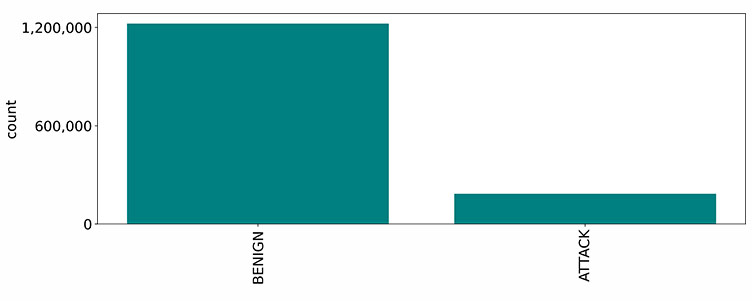
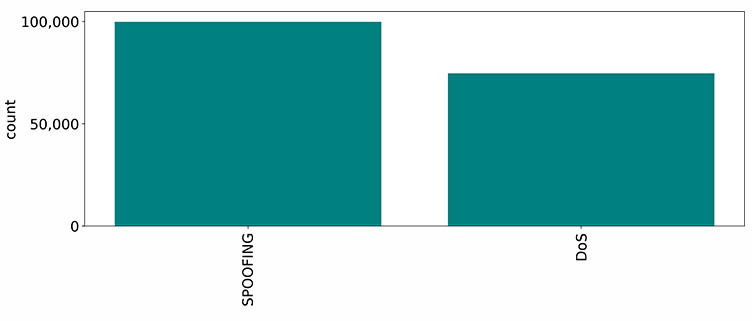
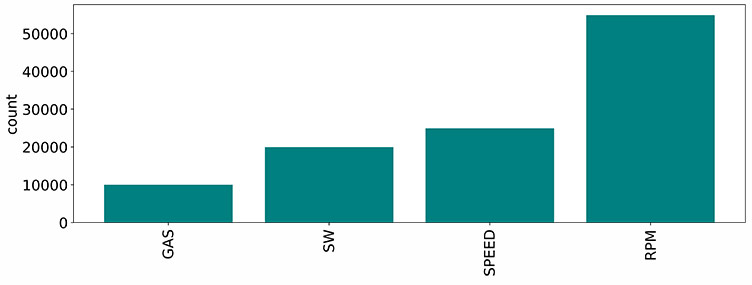
The main CICIoV2024 dataset directory contains four subdirectories related to three different files, namely:
The authors graciously acknowledge the support from the Canadian Institute for Cybersecurity, the funding support from the National Research Council of Canada (NRC) through the AI for Logistics collaborative program, the NSERC Discovery Grant (no. RGPIN 231074), and to Dr. A. A. Ghorbani, Tier 1 Canada Research Chair.
Webinar explanation about CIC IoT datasets: "From Profiling to Protection: Leveraging Datasets for Enhanced IoT Security" by Dr. Sajjad Dadkhah, Assistant Professor and Cybersecurity R&D Team Lead with Q&A by Sumit Kundu.
E. C. P. Neto, H. Taslimasa, S. Dadkhah, S. Iqbal, P. Xiong, T. Rahmanb, and A. A. Ghorbani, "CICIoV2024: Advancing Realistic IDS Approaches against DoS and Spoofing Attack in IoV CAN bus," Internet of Things, 101209, 2024.
The data was collected directly from the vehicle and logged into the CSV files. The repeated packets you see represent the types of messages ECUs send internally.
However, it is important to consider that
You can use the CICIoV2024 dataset in combination with other IoV datasets to reach this number.
Our project was developed on a Ford platform, and other projects used different brands/models.
You can take a look at this paper for more details: ImageFed: Practical Privacy Preserving Intrusion Detection System for In-Vehicle CAN Bus Protocol.